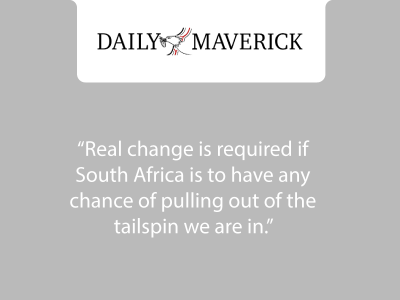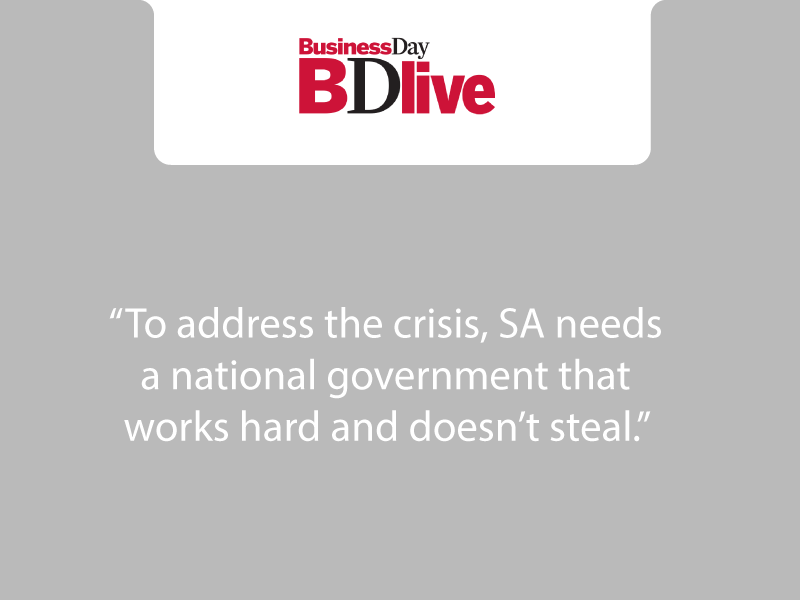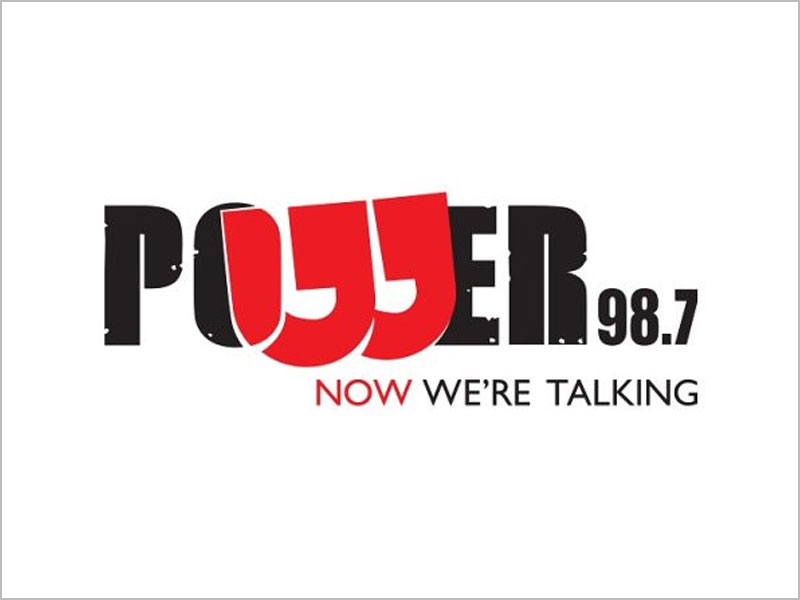
A country with as many challenges as we have needs a short list of clear priorities that will drive an acceleration of economic growth since it is this and this alone that will make possible the amelioration of our polycrisis.
No one who isn’t a Cabinet minister doubts that South Africa is in deep, deep crisis.
It’s true that the lights are staying on longer than they did a few months ago, but Eskom is always one “unplanned outage” (its euphemism for when a poorly maintained generator breaks down) from Stage 4 load shedding. And, despite the organisation being in a permanent state of crisis, it appears to be no nearer to appointing a new CEO than when André de Ruyter announced his resignation in December last year.
The collapse of the railways and the ports continues apace.
Johannesburg, the city that could and should be the beating heart of the economy and the whole of southern Africa, is collapsing. Its ruling politicians increasingly portray foreigners as the cause of the city’s problems, though the malaise, in truth, is down to their own manifest failure to govern remotely well.
Policing is now so broken, it makes the school system look good. Every passing month seems to produce news of the resurrection of someone associated with State Capture, accountability for which is still a much-promised dream.
Did I mention public finances?
Treasury is so worried about its ability to pay government’s bills this year that it has started issuing somewhat panicky requests for departments to rein in spending and cancel projects.
It is challenging, given all that has gone wrong – and all that is still going wrong – to develop a strategy that would begin to dig SA out of the deepening hole in which we find ourselves. There is so much that needs to be done; the plans that are formulated tend to be filled with dozens and dozens of proposals, recommendations and commitments.
These plans are far too complex for a state as overextended and weak as ours, and they are far too elaborate and over-specified to mobilise support for them from the public. The only people who benefit from plans of this kind are officials who don’t want to be held accountable for achieving the most important reforms because they can pretend to busy themselves doing lots of unimportant, albeit less difficult, things.
This is not going to work. A country with as many challenges as we have needs a short list of clear priorities around which to organise its response. Ideally, these priorities will drive an acceleration of economic growth since it is this and this alone that will make possible the amelioration of the polycrisis.
Stopping the descent
But, if we are honest with ourselves, the first goal we should have is not the acceleration of growth, it is the deceleration of the rate of our decline. Raw logic, after all, tells us that it is not possible to begin to rise before you have stopped falling.
So, what would it take to stop the descent?
The Centre for Development and Enterprise has identified three core priorities that must shape the national agenda and be prioritised in the president’s diary. Pursuing them will not guarantee growth; continuing to fail to pursue them, however, will ensure national failure. The stakes are, indeed, that high.
The first priority sits at the very core of the social contract: the state needs to reverse the astonishing gains that have been made by criminal syndicates whose influence is expanding into an ever-increasing range of economic activities.
At this point, it is too much to hope for to expect the state to meaningfully reduce “ordinary” criminality, the levels of which are as high as in any country in the world. More disturbing is that the state has done so little to protect itself from crime, and, in particular, from the crimes committed by members of the social, political and economic elite.
Unless and until this situation is reversed, it is hard to see how the state will ever play a positive role in economic development: if its resources are subject to constant attack and if so many of its officials are in it only for themselves, then it is very hard to envisage how it will play a constructive role in development.
Reversing this requires much more aggressive work from South Africa’s law enforcement agencies. If powerful people do not fear arrest and imprisonment, if there is no risk of their assets being seized and their reputations trashed, the state will be forever weakened from within.
The second priority revolves around the energy and logistics crises: unless these are resolved, the likelihood of SA becoming a failed state is very high.
Progress on energy is evident, though it is overwhelmingly the result of private investment in energy generation which is adding vastly more gigawatts of generating capacity than Eskom is doing. But installing more generation capacity is in some ways the easy part; it is much trickier to ensure that the changes we make now don’t calcify into the kind of high-cost, uncompetitive energy system that has characterised the history of the sector.
The same is true of logistics, with the important distinction that there is no evident progress yet. The steps that have been taken to introduce private sector participation in the ports may do nothing to liberalise the market for the provision of port services.
The third priority relates to South Africa’s public finances, whose unsustainable trajectory has been an ongoing concern for a decade. It has now reached the point where inaction would be the epitome of recklessness.
The government simply has to find a way to restrict spending to a level compatible with a slow-growing economy.
Until this year, it had made decent progress in containing wage growth since 2019, but a budget-busting wage settlement purportedly mandated by the President himself could not have been timed more poorly.
Add to that the implicit commitment to making the SRD grant permanent and the commitment to introduce national health insurance for which no credible costing has been done, and it should surprise absolutely no one that government is having to pay higher and higher interest rates to attract lenders to help it paper over the cracks, but at the price of an ever-increasing interest bill.
Tackling three priorities of this kind – improving the rule of law, addressing the energy and logistics crises and stabilising the public finances – is so basic that it is somewhat shocking that there is a need to motivate for it. These activities are the very essence of governing, and the fact that the ruling party has so singularly failed to deliver them is a scandal about which every citizen should be sleepless with rage.
Real change is required if South Africa is to have any chance of pulling out of the tailspin we are in.
We need a president who places the interests of the country (not the party) at the heart of the government agenda and is backed by a committed, credible and unified team that understands how to manage and bed down change in a large and complex system.
Bernstein is head of the Centre for Development and Enterprise (CDE). This article is based on a new CDE research report, “A Country in Crisis: First steps towards a growth strategy”.
This article was published on Daily Maverick




